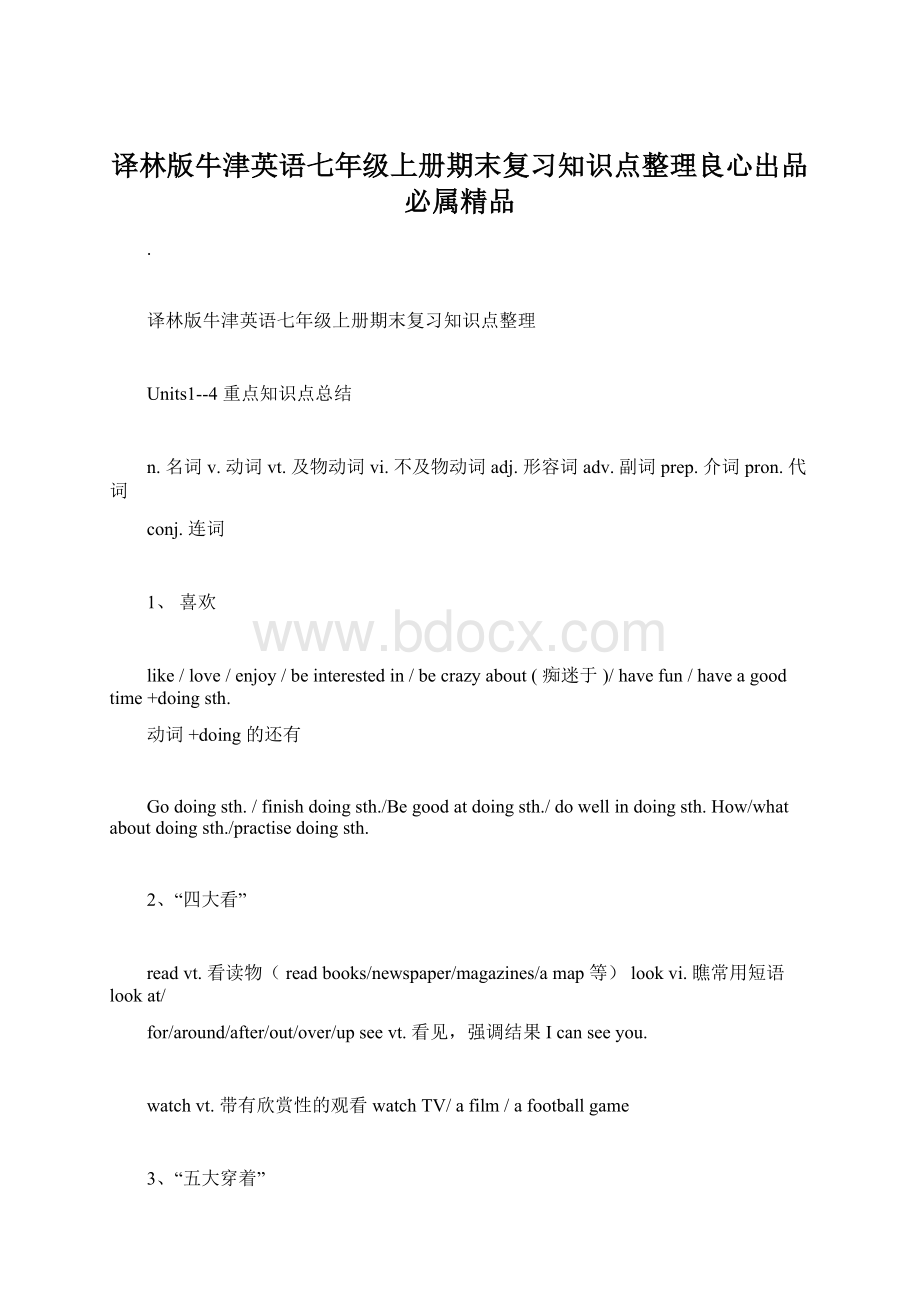译林版牛津英语七年级上册期末复习知识点整理良心出品必属精品.docx
《译林版牛津英语七年级上册期末复习知识点整理良心出品必属精品.docx》由会员分享,可在线阅读,更多相关《译林版牛津英语七年级上册期末复习知识点整理良心出品必属精品.docx(25页珍藏版)》请在冰豆网上搜索。

译林版牛津英语七年级上册期末复习知识点整理良心出品必属精品
.
译林版牛津英语七年级上册期末复习知识点整理
Units1--4重点知识点总结
n.名词v.动词vt.及物动词vi.不及物动词adj.形容词adv.副词prep.介词pron.代词
conj.连词
1、喜欢
like/love/enjoy/beinterestedin/becrazyabout(痴迷于)/havefun/haveagoodtime+doingsth.
动词+doing的还有
Godoingsth./finishdoingsth./Begoodatdoingsth./dowellindoingsth.How/whataboutdoingsth./practisedoingsth.
2、“四大看”
readvt.看读物(readbooks/newspaper/magazines/amap等)lookvi.瞧常用短语lookat/
for/around/after/out/over/upseevt.看见,强调结果Icanseeyou.
watchvt.带有欣赏性的观看watchTV/afilm/afootballgame
3、“五大穿着”
Puton强调“穿上”的动作eg.He____acoatandgoesforawalk.
Wear强调“穿着”的状态;进行时态表示暂时的情况eg.Sheiswearinganewskirtnow./wearglasses
Dress
(1)dresssb.
(2)dressoneself(3)dressupas(4)getdressedIn(穿戴)后接颜色(或衣服),
表示状态look!
Lucyis_____aredskirtandapairofpinkshoes.On后接人指衣服穿在某人身上看出区别
来。
Theredcoatlooksniceonyou.
4、“四大花费”
Spend:
sb.(人)+spend+时间/金钱+onsth.
.
.
sb.(人)+spend+时间/金钱+(in)doingsth.pay:
sb.(人)+pay+金钱+forsth.cost:
sth.(物)
+cost+sb.+金钱Doingsth.costs+sb.+时间
take:
ittakessb.+时间+todosth.
5、“三大地点副词”
Home/there/here前不加任何的介词welcomehome/comehere/gothere
6、“三大使役动词”
Makesb.dosth./havesb.dosth./letsb.dosth.
7、见面打招呼用语
(1)Nicetomeetyou.
(2)Gladtomeetyou.(3)Howareyou?
(4)Howareyoudoing?
(5)Howis
itgoing?
(6)Howiseverythinggoing?
(7)What’sup?
8、基数词+year(s)+old表示“⋯岁”提问用“howold”名词性短语
数词-year-old也表示年龄,但其为形容词性短语“前有冠词后有名(词)”Eg.Helenis11yearsold=
Helenisan11-year-oldgirl.
9、Let’s与letus的区别
Let’sdosth.指包括听者(对方)和说者(我们)都在内,表示建议
Letusdosth.指“让(允许)我们做某事”而听者(对方)不做,只有“我们”做
10、play+the+乐器类名词e.g.Playthepiano
Play+球类运动play+football/playcards/playchess
.
.
11、ShecomesfromShanghai=SheisfromShanghai.注:
如何提问Shanghai及如何改一般疑问句
12、begoodat=dowellin=becleverat=studysth.well
Begoodat(反)bebadatdowellin(反)bepoorin
13、介词over的用法
(1)
”在⋯正上方”Thereisabridgeovertheriver.
(2)
”越过”Aplanefliesoverthehouse
(3)
”超过”Thereareover20boysinthisclass.(4)
”结束”Classisover!
/Gameisover.
14、everyone与everyone辨析
区别
(1)Everyone可以与of连用,而everyone却不能与of连用Eg.everyoneofthechildrenlikes
playingthecomputergames.
(2)everyone只指人=everybody而everyone既指人又可指物共同点:
谓语
动词都要用“三单”
15、family的用法:
“家庭”作为整体谓语动词用“单数”Hehasabigfamily.“家人”强调成员,是复数含
义,谓语动词用“原形”Myfamilyareathome.拓展:
集体名词有people、class、police、sheep、deer、
furniture等
16、all/both/each/every/neither/either的用法
all
(1)三者或三者以上“全部、都”
(2)all+the+名词(alltheafternoon=thewholeafternoon)
(3)all放在行为动词前,名词前;be动词后(4)allof+宾格/名词复数
Both
(1)两者都
(2)后可跟of+宾格/名词复数Bothsidesofthestreetaregrowntrees.Each指两个或两个以上“每
一个”个体Eachsideofthestreetisgrowntrees.
Every指许多人或事物的“全体”后接名词单数Everystudentishere.所有人都在。
.
.
Neither指两者都不neitherofyouwillgototheparty.
Either指两者中任意一人意为“要么.要么”Eitheryouoryourbrotherwillgototheparty.
17、Walk的用法
(1)作为及物动词;意为“遛(动物);陪着某人走”walkthedog=takethedogforawalk
(2)作为不及物动词;意为“走、步行”walktoschool=gotoschoolonfoot
(3)作为名词;意为“步行、走”takeawalkaftersupper=gowalkingaftersupper
(4)walking作为动名词常做主语Walkingisgoodforyou.
18、含有o结尾的名词变成复数加es的有:
黑人(Negro)英雄(hero)喜欢吃芒果(mango)、西红柿(tomato)和土豆(potato)
19、系动词中的感官类动词:
look(看起来)sound(听起来)smell(闻起来)taste(尝起来)feel(摸起来)后加形容词
20、make的两种用法:
(1)make+sb.+adj.eg.Makemehappy
(2)makesb.+dosth.
21、hope的用法
(1)不及物动词hopetodosth.Ihopetohearfromyousoon.
(2)后加that从句Ihopeyoucanfinishyourworksoon.注意:
无hopesb.todosth.用法;只有wish
sb.todosth.
22、week/weekday/weekend的用法
.
.
Week周;指fromMondaytoSundayweekday工作日;指fromMondaytoFridayWeekend周末;
指SaturdayandSunday(at/onweekends)
23、else与enough的用法
else放在不定代词、疑问代词后面如:
whatelse/anyoneelse
enough形容词放在enough前面;名词放在enough后面,简称“形前名后”luckyenoughenoughtime
24、one、it用法辨析
One“同类不同一”只可代指可数名词单数Idon’tliketheyellowbike,showmearedone.Ones是
one的复数;Wouldyoulikeatoy?
Yes,I’dlikenewones=I’dlikenewtoys.It代指“同一物品”I
haveacar.Itisred.
25、What’sthedatetoday?
whatdayisittoday?
What’sthetime?
=whattimeisit?
26、infrontof与inthefrontof区别
Infrontof在个体外部的前面(反)behindinthefrontof在物体内部的前面(反)atthebackof
27、help的用法
(1)helpsb.(to)dosth.
(2)helpsb.withsth.
28、sayhellotosb./saysorrytosb./saygoodbyetosb./saythankstosb.
29、open的用法
(1)及物动词,“打开”openthebox
(2)形容词“开着的”Thewindowisopen.Close的用法
(1)及物动词,“关上”closethedoor过去式、过去分词皆为closed
(2)形容词为closedTheshop
isclosedallthemorning.
.
.
30、两“借”lend与borrow的用法
AlendBsth.=Alendsth.toB(A把东西借出去借给了B)eg.Helendhisbiketome
Aborrowsth.fromB(A向B借了某物,A为借入)eg.Sheborrowedabookfromthelibrary.
31、farawayfrom=befarfrom但两者前皆不可跟具体距离Myhomeisfar(away)frommysister’s.
Awayfrom前可跟具体距离Myhomeistenmilesawayfromthepark.
32、few/afew/little/alittle的区别
Little/alittle+不可数名词few/afew+可数名词
Afew/alittle表示肯定(一点/一些)few/little表示否定(几乎没有)
33、Exercise动词或名词“锻炼”不可数。
Exercise名词表示“练习、操”可数,复数形式
34、toomuch/toomany/muchtoo/very的用法区别
toomuch+不可数名词或者做副词性短语放在动词后面toomany+可数名词muchtoo+形容词表示
“太⋯.”Very+副词/形容词
35、need的用法
(1)行为动词,意为“需要”needsth.Doyouneedacupofcoffee?
needtodosth.Sheneedsto
findagoodjob.
(2)情态动词,意为“需要,必须”needdosth./needn’tdosth.Youneedn
’tdo
thehouseworkeveryday.(3)名词,意为“需要,需求”Afriendinneedisafriendindeed.
患难见真
情。
Theflowersareinneedofwater.花儿需要水。
.
.
36、trousers复数名词;单独做主语时谓语动词用复数形式;而与pair连用时,谓语动词要与pair一致
类似的复数名词还有:
shoes、jeans、glasses、chopsticks、gloves、scissors等。
七年级英语上册
Units5--6单元知识点整理
Unit5Let
’scelebrate!
1.dressup
打扮
2.dressupasaghost
乔装打扮成鬼
3.haveaguess
猜一猜
4.atChristmas=onChristmasDay
在圣诞节
5.Mid-AutumnFestival
中秋节
6.enjoythefullmoon
赏满月
7.knockon/atpeople
’sdoors
敲人们的门
8.playatrickonsb./playtricksonsb.
捉弄某人
9.seem+adj.
Heseemsveryhappy.seemtodo
⋯Heseemstobeveryhappy.Heseemstolike
apples
Itseemsthat+
句子。
Itseemsthatheisveryhappy.
他似乎很开心。
10.bedifferentfrom
⋯与⋯不同
11wearmasks
戴面具
12.haveaparty
开派对
13.learnaboutdifferentfestivalsaroundtheworld
了解全世界不同的节日
14.aspecialday
特别的一天
15.makepumpkinlanterns
做南瓜灯
16.makelanternsoutofpumpkins
把南瓜做成灯
17.visithouses
串门
.
.
18.playagamewiththepeopleinside
和里面的人做一个游戏
19.liondance
舞狮
20.findout
找到,发现
21.takealotofphotos
拍很多的照片
22.aroundtheworld=allovertheworld
全世界
23.paintone
’sface
给脸涂色
24.ontheeveningof
⋯.
在⋯.的晚上
25.giveussomecandyasatreat
给我们一些糖果作为招待
=giveusatreatofcandy
26fun
不可数名词muchfun
很多乐趣
havelotsoffun=havegreatfun
玩得开心Whatgreatfun
多么大的乐趣!
27.onHalloween
在万圣节前夕
28.atarestaurantnearmyhome
在我家附近的一家餐馆
29.someothernicethings
一些别的好东西
30.whatotherthings=whatelse
别的什么东西
31.ontheradio
在收音机里
32letofffireworks
放烟火
33.watchthefireworks
看烟火
34.amusicanddanceshow
一场音乐舞蹈表演
35.mostChinesefamilies
大多数中国家庭
36.atthistimeofyear
在一年的这个时候
句子
1.
Let’scelebrate.
让我们庆祝。
2.
Whatisyourfavouritefestival?
=Whatfestivaldoyoulikebest?
你最喜欢的节日是什么?
.
.
3.
Allmyfamilygettogetherandhaveabigdinner.
我所有的家人聚集在一起吃大餐。
4.
ThankyoufortellingmeabouttheMid-AutumnFestival.
谢谢你告诉我中秋节的情况。
5.
Childrenhavelotsoffunonthatday.
在那天孩子们有很多的乐趣。
6.It’sreallyaspecialday.
这真是特殊的一天。
7.
Familymembersgettogetherandgiveeachotherpresents.
家庭成员聚集在一起并互送礼物。
8.
Howdoyouusuallycelebrateyourbirthday?
你通常怎样过生日?
9.
Whatdoyougetasbirthdaypresents?
你得到什么作为生日礼物?
10.
TheSpringFestivalisanimportantfestivalinChina.
在中国春节是个重要的节日。
11.
IamonholidayinNewYork.
我在纽约度假。
12.
WhatdoyoudotocelebratetheChineseNewYearinBeijing?
你们在北京做什么事庆祝春节?
13.
ThereisagreatSpringFestivalGalaonTVeveryyear.
电视上每年都有盛大的春节联欢晚会。
14.
Childrenhavelotsoffunonthisday.
孩子们在这一天玩得很开心。
15.
Usuallyourparentsgetnewclothesreadyforus.
我们的父母为我们准备好新衣服。
16.
Wegetredpacketsfromourparents.
我们从父母那得到压岁钱。
17.
Theyarereallywonderful.
他们真的很精彩。
Unit6Foodandlifestyle
1.allkindsoffood
各种各样的食物
2.keepfit=keephealthy
保持健康
3.keep⋯⋯away
远离
4.plantodo
⋯
计划做⋯(planning)
5.morethan
超过,多于
6.danceforhalfanhoureveryday
每天跳舞半小时
7.feelhungrybetweenmeals
在两餐之间感到饿
.
.
8.Toomuchsugar
太多糖
9.changemylifestyle
改变我的生活方式
10.aswimmingpool
一个游泳池
11.fourkilosofmeat
四公斤肉
12.fivecartonsofmilk
五盒牛奶
13.howtokeepfit
如何保持健康
14.lessthan3timesaweek少于一周三次threetosixtimesaweek
一周三到六次
15.exercisemore
多运动
16.eatless少吃
17.Havealook
看一看
18.takeawalk
散步
19.A